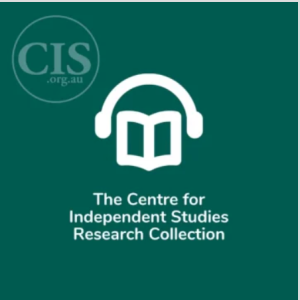Centre for Independent Studies
Let’s share good ideas. 💡 The Centre for Independent Studies promotes free choice and individual liberty and the open exchange of ideas. CIS encourages debate among leading academics, politicians, media and the public. We aim to make sure good policy ideas are heard and seriously considered so that Australia can prosper.
Episodes

Thursday Mar 13, 2025
Thursday Mar 13, 2025
In this episode, we delve into the proposal of allowing homebuyers to access their superannuation funds for purchasing a home. We explore how building housing equity and accumulating superannuation serve as alternative methods for ensuring financial security in retirement. The discussion highlights that while the government aims to ensure individuals prepare for retirement, it doesn't necessarily have a stake in the specific method chosen. Therefore, if someone prefers to save by paying off a mortgage rather than accumulating superannuation, governmental obstruction of that choice seems unwarranted.Read the paper: https://www.cis.org.au/publication/super-for-housing/Research by: Matthew Taylor and Peter TulipHosted by Emilie Dye.Audio produced by Randall EvansTo become a member: https://www.cis.org.au/membership-2-step-1/Subscribe to our other shows:Liberalism in Question features thought-provoking interviews with world experts in politics and culture from a Classical Liberal perspective. Subscribe here: https://liberalisminquestion.podbean.com/
The CIS Research Collection delivers our research papers in an audio format so that you can listen to them on the go. Subscribe here: https://cisresearch.podbean.com/What You Need to Know About delivers concise insights from CIS experts, breaking down complex topics like policy, economics, and societal challenges. Subscribe here: https://whatyouneedtoknowabout.podbean.com/ CIS Events Experience: From the studios of CIS our events team brings you engaging discussions from our live events, featuring lectures, panel discussions, and conversations with leading experts: https://cisevents.podbean.com/

Thursday Mar 13, 2025
Thursday Mar 13, 2025
In "Fractured Loyalties: Australian Citizenship and the Crisis of Civic Virtue," Peter Kurti examines the foundational role of tolerance in secular liberal democracies, particularly in embracing religious diversity. He explores how this principle, integral to the liberal conception of citizenship, is under threat due to a concerning rise in antisemitism within Australia. Kurti argues that such intolerance not only undermines social cohesion but also erodes the civic virtues essential for a healthy democracy. Through a historical lens, he underscores the necessity of mutual respect and equal concern among citizens to maintain the fabric of civil society.
This audiobook delves into the challenges posed by diminishing civic understanding and the imperative to uphold the principles that bind a diverse nation. Listeners are invited to reflect on the importance of reinforcing civic virtues to counteract divisive forces and ensure the resilience of Australia's democratic values.
Read the paper here: https://www.cis.org.au/publication/fractured-loyalties-australian-citizenship-and-the-crisis-of-civic-virtue/
Subscribe to all our shows:What You Need to Know About delivers concise insights from CIS experts, breaking down complex topics like policy, economics, and societal challenges. Subscribe here: https://whatyouneedtoknowabout.podbean.com/
The CIS Research Collection delivers our research papers in an audio format so that you can listen to them on the go. Subscribe here: https://cisresearch.podbean.com/Liberalism in Question features thought-provoking interviews with world experts in politics and culture from a Classical Liberal perspective. Subscribe here: https://liberalisminquestion.podbean.com/CIS Events Experience: From the studios of CIS our events team brings you engaging discussions from our live events, featuring lectures, panel discussions, and conversations with leading experts: https://cisevents.podbean.com/
#FracturedLoyalties #Citizenship #CivicVirtue #Democracy #Australia #Tolerance #SocialCohesion #Antisemitism #LiberalValues #PeterKurti #Audiobook #PoliticalPhilosophy #CivicEngagement #Freedom #Diversity #auspol

Monday Mar 03, 2025
Monday Mar 03, 2025
Interest, Usury and the Common Good by Ian Harper and Peter Kurti
Read the paper here: https://www.cis.org.au/publication/interest-usury-and-the-common-good/Listen to all our papers here: https://cisresearch.podbean.com/
Delve into the intricate history and ethical debates surrounding the practice of charging interest in "Interest, Usury, and the Common Good," authored by Ian Harper and Peter Kurti. As economies evolved, so did perspectives on interest, shifting from outright prohibition to discussions about fair rates. Harper and Kurti trace this transformation, examining how the term 'usury' became associated with excessively high interest rates deemed unjustifiable. They analyze the balance between facilitating economic growth through credit and maintaining ethical lending practices that serve the common good. #Audiobook #Economics #Finance #Ethics #Usury #InterestRates #CommonGood #History #Philosophy #Christianity #CIS

Wednesday Feb 12, 2025
Wednesday Feb 12, 2025
In this episode, we dive into New Zealand’s groundbreaking housing policy reforms and explore how they’ve successfully tackled the housing crisis. Join us as we unpack the findings of the Centre for Independent Studies’ report, Less Crowded Houses: The Success of NZ’s Housing Policy Reforms and Implications for Australia by Stuart Donovan. What lessons can Australia learn from these bold changes? How did New Zealand streamline housing regulations to deliver real results? Tune in for an insightful discussion on housing policy, urban planning, and the path forward for more affordable living.
Ideal for policymakers, urban planners, and anyone curious about fixing the housing crisis!Research by: Stuart Donovan.Hosted by Emilie Dye. Audio produced by Randall Evans.
To read the paper: https://www.cis.org.au/publication/less-crowded-houses-the-success-of-nzs-housing-policy-reforms-and-implications-for-australia/To become a member: https://www.cis.org.au/membership-2-step-1/ Subscribe to our other shows: Liberalism in Question features thought-provoking interviews with world experts in politics and culture from a Classical Liberal perspective. Subscribe here: https://liberalisminquestion.podbean.com/
The CIS Research Collection delivers our research papers in an audio format so that you can listen to them on the go. Subscribe here: https://cisresearch.podbean.com/ What You Need to Know About delivers concise insights from CIS experts, breaking down complex topics like policy, economics, and societal challenges. Subscribe here: https://whatyouneedtoknowabout.podbean.com/
#HousingCrisis #UrbanPlanning #AffordableHousing #NewZealand #PolicyReform #Australia #HousingSolutions #Podcast #RealEstate #EconomicPolicy

Tuesday Feb 11, 2025
Tuesday Feb 11, 2025
Less Crowded Houses. NZ’s housing policy success and implications for Australia by Stuart Donovan.Audio produced by Randall Evans.
To read the paper: https://www.cis.org.au/publication/less-crowded-houses-the-success-of-nzs-housing-policy-reforms-and-implications-for-australia/
To become a member: https://www.cis.org.au/membership-2-step-1/
Introduction to the Paper:
Many Australians are increasingly concerned by deteriorating housing affordability and its implications for socio-economic outcomes. In a recent survey, 62% of respondents agreed that “continued increases in house prices is bad for the economy and is exacerbating wealth inequality”.[1] In another survey, around two-thirds of respondents agreed that the federal government was not doing enough to address Australia’s housing problems.[2] Analysis by the Australian Bureau of Statistics finds genuine cause for concern, with rates of home ownership for those aged 25-39 years falling from 66% to 55% in the period from 1991 to 2021.[3]
Such concerns are increasingly reflected in policy, with a recent federal government report observing that “rising housing costs” pose “challenges for many young Australians”.[4] The same report pointed to a need for housing supply to be “responsive to demand”, especially in locations that are accessible to jobs. There is indeed growing evidence that housing policy reforms can increase supply and support affordability. Perhaps most notably, rates of housing supply in New Zealand have — after a decade of reform — surged past Australia. For these reasons, this paper reviews New Zealand’s reforms and considers potential lessons for Australia.
First, the paper summarises the context to housing policy reforms in New Zealand, which have sought to streamline planning processes and enable housing in desirable locations, a process known as ‘upzoning’. The term is used here to describe changes to planning policies that enable more housing to be built, such as increased building height limits. A recurring theme in New Zealand’s housing policy reforms has been the potential distributional effects of upzoning — that is, who ‘wins’ and ‘loses’. Growing awareness of the distributional benefits of housing appears to have fostered broad-based support for reforms in New Zealand.
The paper then briefly reviews empirical evidence on the impacts of New Zealand’s housing reforms. These effects are apparent from even a cursory comparison of housing outcomes in councils that have upzoned versus those that have not. In 2023, for example, upzoned councils in Auckland, Canterbury, and Lower Hutt have accounted for around two-thirds of all the dwelling consents issued in New Zealand, which is much more than their share of the population. Several credible economic studies find upzoning supported large and rapid improvements in housing affordability as well as a rapid expansion in social housing.
Thirdly, the paper presents some preliminary analyses of New Zealand’s housing policy reforms. Whereas dwelling growth in Canterbury and Auckland initially lagged population growth, after each region was upzoned in 2011 and 2016, dwellings have grown faster than population. Moreover, analysis of data from Auckland shows the population of people aged 20-34 years grew most strongly in areas that experienced the most upzoning, and vice versa for those aged 65+ years. While more research is needed, these preliminary analyses suggest young people may have disproportionately benefited from these reforms, where benefits likely represent a ‘double dividend’ of more affordable housing and better access to jobs and amenities.
There have been several recent overviews of New Zealand’s housing reforms, including Maltman (2023), Greenaway-McGrevy (2024), Blick and Stewart (2024) and Politano (2024). These summaries focus on estimates of the effects of Auckland’s Unitary Plan. Like this paper, they agree that upzoning led to large increases in construction and improvements in affordability. This paper updates this earlier work, provides a broader context, and is targeted at a broad Australian audience.
To conclude, this paper argues that Australia can learn from New Zealand’s experience: enabling more housing can quickly lead to more supply and improved affordability.Read more: https://www.cis.org.au/publication/less-crowded-houses-the-success-of-nzs-housing-policy-reforms-and-implications-for-australia/#auspol #nswpol #nz #nzhousing #realestate #property #propertyinvesting

Thursday Nov 21, 2024
Thursday Nov 21, 2024
Watch here: https://youtu.be/0FS0cL7nqUk All our links: https://linktr.ee/centreforindependentstudies In this episode of Liberalism in Question, David Kinley, Chair of Human Rights Law at the University of Sydney, joins us to explore the relationship between freedom, liberty, and responsibility. As the author of The Liberty Paradox, David delves into the distinctions between these core concepts of liberalism and the responsibilities that come with exercising freedom. Tune in for a thoughtful discussion on how liberalism can navigate these tensions in today's world.
#Liberalism #HumanRights #DavidKinley #FreedomVsLiberty #Responsibility #Philosophy #PoliticalTheory #TheLibertyParadox #LiberalismInQuestion #Liberty #Freedom #Ethics #CivilRights #LawAndSociety

Thursday Nov 21, 2024
Thursday Nov 21, 2024
In Gorillas in the Mist: How Government Obscures Its Spending, Gene Tunny examines how Australian governments increasingly rely on off-budget mechanisms—such as loans, equity injections, and special investment funds—to finance major policy initiatives without those costs appearing in the core budget balance. These tactics allow governments to maintain the appearance of fiscal discipline while accumulating hidden financial risks. The paper details the rapid growth of off-budget measures, evaluates their impact on transparency, accountability, and inflation, and calls for greater scrutiny to ensure public money is managed responsibly.
Read the paper here: https://www.cis.org.au/publication/gorillas-in-the-mist-how-government-obscures-its-spending/ Audio Produced by: Randall Evans
Subscribe to all our shows:What You Need to Know About delivers concise insights from CIS experts, breaking down complex topics like policy, economics, and societal challenges. Subscribe here: https://whatyouneedtoknowabout.podbean.com/
The CIS Research Collection delivers our research papers in an audio format so that you can listen to them on the go. Subscribe here: https://cisresearch.podbean.com/Liberalism in Question features thought-provoking interviews with world experts in politics and culture from a Classical Liberal perspective. Subscribe here: https://liberalisminquestion.podbean.com/CIS Events Experience: From the studios of CIS our events team brings you engaging discussions from our live events, featuring lectures, panel discussions, and conversations with leading experts: https://cisevents.podbean.com/

Thursday Nov 07, 2024
Thursday Nov 07, 2024
Watch here: https://youtu.be/EVmqHRwsooY All our links: https://linktr.ee/centreforindependentstudies In this episode of Liberalism in Question, we are joined by Australian businessman, entrepreneur, and free-market advocate Ron Manners. As the founder of the Mannkal Economic Education Foundation and a vocal proponent of individual liberty, Manners shares his perspective on the evolution of classical liberalism, the role of free markets in society, and the current challenges facing economic freedom globally. Tune in as we explore the intersection of personal responsibility, limited government, and the path forward for liberal values in a rapidly changing world.#auspol #libertarian #mining

Thursday Oct 24, 2024
Thursday Oct 24, 2024
Watch here: https://youtu.be/T6Ga9mjdFhs All our links: https://linktr.ee/centreforindependentstudies
In this compelling interview, Robert Forsyth engages in a deep conversation with Mary Eberstadt, acclaimed author and social commentator, on the profound effects of the sexual revolution and the critical importance of families in sustaining a healthy liberal democracy. Together, they explore how the cultural shifts of the 20th century have transformed societal norms, personal identity, and the political landscape, while discussing why the family remains a cornerstone of freedom and civic life.
What impact has the sexual revolution had on modern society? How do strong family structures contribute to the success of democratic systems? Robert and Mary unpack these questions, offering thought-provoking insights on the intersections of culture, politics, and the future of Western civilization.#auspol #reproductiverights #thepill #womensrights #christianity
Wednesday Oct 16, 2024
Wednesday Oct 16, 2024
All our Links: https://linktr.ee/centreforindependentstudies Listen to this recording of our thought-provoking CIS event that explored the complexities of Australian identity, politics, and social cohesion. The event featured engaging discussions with special guests Nyunggai Warren Mundine, Dr. Tanveer Ahmed and Damien Freeman.
Held after the historic 2023 referendum, which saw a 60/40 rejection of the Voice, the conversation examines the deepening divisions in Australian society. As public opinion shifted before the vote, broader concerns about cultural and political fractures came to the forefront. The speakers tackled important questions about the accusations of racism, the rise of populism and identity politics, and whether Australia’s social fabric is fraying in an era of diminishing trust and growing polarization.
What does it mean to be Australian in the 21st century? What unites us as a nation, and how do we nurture the social cohesion for which Australia has been known?
The discussion featured:
Damien Freeman, writer, lawyer, philosopher, and author of The End of Settlement.
Nyunggai Warren Mundine, Director of the Indigenous Forum at CIS and co-editor of Beneath the Southern Cross.
Dr. Tanveer Ahmed, psychiatrist, author, and columnist for the Australian Financial Review.
Peter Kurti, Director of the Culture, Prosperity & Civil Society program at CIS and co-editor of Beneath the Southern Cross.
This recording captures their insights and reflections on the key issues shaping Australia's future.#Australia #AustralianPolitics #VoiceReferendum #IdentityPolitics #SocialCohesion #AusPol #WarrenMundine #CulturalDebate #Populism #Unity #IndigenousVoice #Referendum2023 #NationalIdentity #BreakingNews #TrendingNow #PoliticalDebate #CurrentAffairs

Centre for Independent Studies
Let’s share good ideas. 💡
The Centre for Independent Studies promotes free choice and individual liberty and the open exchange of ideas. CIS encourages debate among leading academics, politicians, media and the public. We aim to make sure good policy ideas are heard and seriously considered so that Australia can prosper.




